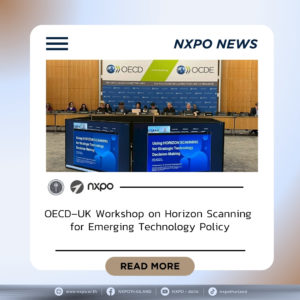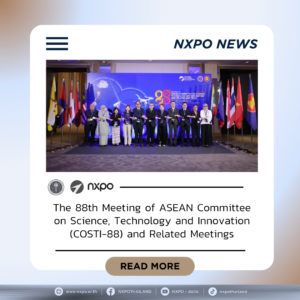During Thailand Research Expo 2023, NXPO President Dr. Kitipong Promwong participated in a panel of experts in a seminar titled “Research and Innovation Investment Directions for Economic and Social Development”. He underscored the pivotal role that research and innovation play in achieving the thirteen milestones outlined in the present National Economic and Social Development Plan. To achieve the 2% research and innovation investment target by 2027, it is necessary to introduce measures to increase research investment by a sum of THB 300 billion, or THB 60 billion annually, with 70% contribution from the private sector, 80% of which coming from 40 large corporates.

To attain developed country status, a per capita income of THB 400,000 annually is essential. While this goal might be within reach for wage earners, a wide gap exists for agricultural workers, whose current income stands around THB 100,000 per year. To transition from middle-income status, it is necessary to raise research and development investments. The current investment stands at 1.22% of GDP, or about THB 17-18 trillion, while the target of 2% of GDP would be approximately THB 28 trillion baht. Hence, an additional THB 11 trillion investment is required.

Dr. Kitipong emphasized that sustainability – a balance of economic, social and environmental development – was integral in shaping the higher education, science, research and innovation policy framework. Two primary avenues were identified as vehicles to break free from the middle-income trap: innovation-driven enterprises (IDEs) and culture-based creative economy. Thailand’s rich culture has potential to add significant economic value to the tourism industry, giving rise to opportunities in digital media and content, projected to contribute THB 500 billion to the economy.
A skilled workforce is pivotal for fostering economic growth. The higher education sandbox measure has been introduced with the main objectives to develop professionals to meet the requirements of the manufacturing and service industries, as well as learners. Chulalongkorn University Faculty of Engineering now offers a new Work-Integrated Learning (WIL) program that allows students to study and work concurrently.
Dr. Kitipong stressed that Thailand should not rely on cheap labor costs to compete in the global market. Skill enhancement is necessary. This is achievable as over the past three decades, Thai universities have greatly strengthened and substantial investments have been made to develop scientific infrastructure, including science parks spread throughout the country to support the growth of innovation-based startups and SMEs. Moreover, policies are also in place for BCG and non-BCG sectors, such as aviation, electric vehicle, digital media and content, logistics and smart electronics.
Dr. Kitipong further revealed recent initiatives that are expected to foster IDEs. Revisions have been made to several laws and regulations to ease research commercialization processes. The introduction of holding company scheme aims to encourage public research institutes and universities to establish holding companies to facilitate research commercialization, joint investment with private companies and spinoffs. An an e-commercial platform is expected to assist enterprises to access domestic and international markets. Dr. Kitipong suggested areas that the government can focus on to boost the competitiveness such as streamlining government work process, data integration and logistics systems.
In addition to Dr. Kitipong, other speakers at the seminar representing the Science, Research and Innovation Council, the National Economic and Social Development Council, and the Federation of Thai Industries, unanimously agreed that research and innovation are key drivers for Thailand’s transition from middle-income to developed country status. Incentives should be provided to entice more research and innovation investment from the private sector, especially in Thailand’s promising sectors such as agriculture, food and digital technology, as well as in human capital to adapt to changes in the global landscape.







